Downtown LA church keeps the city's mayhem at bay -- one service at a time
Published in Religious News
LOS ANGELES — South Hope Street is quiet on a Sunday morning. Five blocks over in Skid Row, police are investigating a shooting, but in the Financial District, calm prevails.
Parking lots are nearly empty. Guests at the Sheraton are checking out early. The unhoused have mostly left their sidewalk beds, and Jeffrey Taylor and Deborah Johnson are preparing for church.
With just a half hour before service, the husband-and-wife team fall into familiar routines: scanning the sidewalk and garden for wrappers, food scraps, clothing and needles, spraying deodorizer near the front door and hauling out the welcome sign, whose bottom line reads:
… in this place will I give peace.
Hope is a rare commodity on the struggling and hardened streets of downtown Los Angeles, and since 1910, Third Church of Christ, Scientist has extended this promise to passersby without interruption.
Taylor and Johnson are not about to jeopardize that run. In a religion with no priests, they are the first and second readers, who conduct the weekly worship.
A few minutes before noon — with two congregants in the pews — the service is about to begin. Organist Lee Jessup begins a short prelude with a chime tone. Though not a member of the church, he's played here for almost 10 years.
Today's soloist, mezzo-soprano Sarabeth Belón, is sitting in front, and usher Alvin Bernard takes a position in the back, ready to hand programs to late arrivals.
Like a meadow in a dark forest, this lone two-story brick building with its teal awnings and English garden is a bulwark in a neighborhood where crime and homelessness, addiction and despair are often on display.
Overshadowed by granite-and-glass high-rises with their empty floors and shuttered storefronts, it has survived redevelopment and earthquakes, modernism and the pandemic while holding fast to its 19th century principles.
At 11:59 a.m., Taylor, in a white shirt, blue tie, no jacket; and Johnson, in a white blouse and silver necklace with a turquoise stone; take their seats at the reader's desk, a small table set with a cloth and two book stands and flanked by twin flower arrangements.
"Welcome," Taylor says, inviting the gathered to sing Hymn 342. Belón stands to lead.
This is the day the Lord hath made …
Decades ago, observing the Sabbath was easy in a city as God-fearing as any other in the nation.
Rising above the western skyline before freeways had cut their paths, spires and towers signaled many of the ecclesiastical palaces — St. Paul's Cathedral, St. Joseph's, First Methodist — calling the faithful from Queen Anne neighborhoods that along with their original churches have long since disappeared.
Such was the fate of the Third Church. Once a music hall and auditorium, this towering edifice of brick and stained glass with a monstrous pipe organ and nearly 1,700 seats was red-tagged and razed after the 1971 San Fernando earthquake.
Spared, however, was the building next door. Built in 1936 as a reading room — a familiar hallmark of Christian Science, one of hundreds recognizable on Main Streets around the country — it has served as a salesroom for church publications, a club room for Scientists and an open door for idle pedestrians looking for respite from the street.
Today, the building doubles as a chapel. Well-stuffed armchairs and table lamps, oak bookcases and desks give way to an orderly progression of white and teal pews. Stained-glass windows, retrieved from the original church, stand ceiling height.
Few faiths are as bookish or as unapologetic for holding on to tradition in both language and aesthetic. As Johnson begins reading a medley from the King James Bible and the 1875 founding text by Mary Baker Eddy, "Science and Health," the room feels caught in amber.
Cease ye from man, whose breath is in his nostrils: for wherein is he to be accounted of?
More members trickle in. Some are nurses who practice the faith and work at Broadview, a Christian Science nursing facility that opened in 1947 on 11 acres in Montecito Heights. Others, like Helen Lechner, arrive out of a sense of personal devotion.
Lechner, who lives in Torrance and attends services in Hermosa Beach, cares about the downtown church as if it were "family."
Like most Christian Scientists, she does not give her age but admits to remembering when City Hall was L.A.'s tallest building and she walked with her mother from their Westlake home to the brick edifice on Hope Street.
"Downtown was clean. We felt safe," Lechner said, "and the original church was very majestic, very inspiring and well attended."
Few modern religions grew as quickly and prosperously as Christian Science at the start of the last century, riding on the promise of health and healing through steadfast devotion. (Aimee Semple McPherson's Angelus Temple in Echo Park similarly promised healing.)
Today its members, while fewer, are no less ardent. They have weathered scandal and are accustomed to being mistaken for Scientologists or derided for privileging faith over science and medicine. Though neither Taylor nor Johnson has received a COVID-19 vaccine, they are quick to say that Scientists are free to seek out medical treatment if they wish.
"The best I can explain Christian Science is by analogy," says Taylor. "Think about the law of aerodynamics: You can't see it, but if you correctly apply the principles, you can fly."
Taylor was born into a Christian Science home and found his faith strengthened by a healing. As a young man in New York City in the 1980s, he drifted from the religion, working as a music producer and a sound designer in theater, soon caught up in a "darker, taxing lifestyle."
Rehab followed, but he argues Christian Science got him through and has since remained unwavering in his faith. By the late '90s, he started spending time in Los Angeles, where there were additional job opportunities.
Johnson, who was an actor in New York and cast in films by Woody Allen and Dan Aykroyd and in "Law and Order," joined Taylor in 2012 after he proposed.
He had joined a Christian Science church in San Marino, but Third Church and downtown Los Angeles, reminiscent of New York City, drew him in. He and Deborah consider themselves volunteers, although the church's board of directors recently started to pay them a monthly stipend.
Midway in the service, Belón stands to sing the solo. Her voice beautifully traces the arc of notes in the organ's opening chords. This fall, the 30-year-old will perform as an alto chorister in L.A. Opera's "Romeo and Juliet."
When I consider thy heavens, the work of thy fingers, the moon and the stars, which thou hast ordained; what is man, that thou art mindful of him?
When Huell Howser visited Third Church in 2009, he was characteristically slack-jawed.
"What makes this so important and such a treasure is its juxtaposition between all the hustle and bustle and goin' and comin' and all the people who live and work in downtown Los Angeles," he said.
Time, however, was having its way with the building, partially covered with ivy and cast in perpetual twilight. Drawing upon their theater background, Taylor and Johnson began a slow renovation.
The palette was lightened, unfinished wood painted white, the ceiling a shade called fairy-tale blue. Theater seating was replaced by pews, and the neon sign in front was repaired.
But just as they finished, the hustle and bustle came to a stop. The pandemic closed the reading room, once open five days a week, four hours a day. Services were held over the phone and on Zoom. Today, the hours are still abbreviated: Wednesdays and Sundays, 11:30 a.m. to 1:30 p.m., which they hope to expand to allow for more private reading and reflection.
And revenues are down. As collections have dropped, the church has grown more dependent on its lease of a parking lot where the original building once stood. But with fewer people parking downtown, that amount has fallen, too.
Other Christian Science churches provide a picture of what loss looks like. First Church in Pico-Union is now Iglesia Adventista Central Hispana del Séptimo Día, and Second Church on West Adams Boulevard houses the Art of Living Foundation with Gurudev.
After the solo, Taylor and Johnson resume the readings. Their voices rise and fall in cadence with the text, and when they are finished, the congregation stands for a final hymn. Bernard, the usher, passes the purse. Taylor reads the Scientific Statement of Being, and Johnson a selection from Scripture. Then the benediction:
Beloved ye are come unto the church of the living God.
A little past 1 p.m., the church empties. Johnson places new readings in the front display window, and Bernard pulls the welcome sign in from the sidewalk.
They cut the lights and air conditioning and step out into the city. A helicopter passes overhead. A few blocks away, a siren wails.
©2024 Los Angeles Times. Visit latimes.com. Distributed by Tribune Content Agency, LLC. ©2024 Los Angeles Times. Visit at latimes.com. Distributed by Tribune Content Agency, LLC.
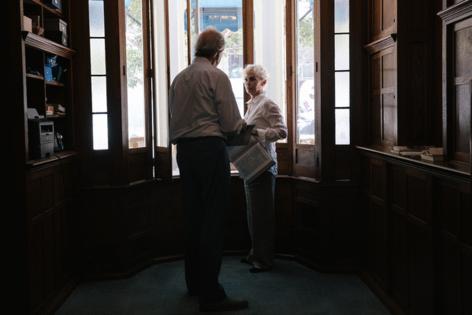
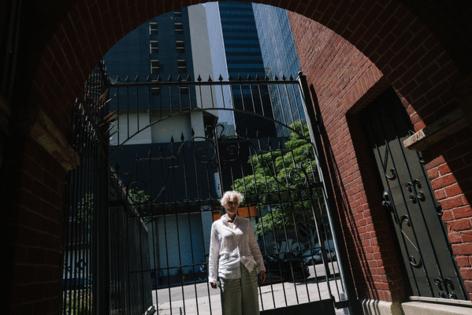
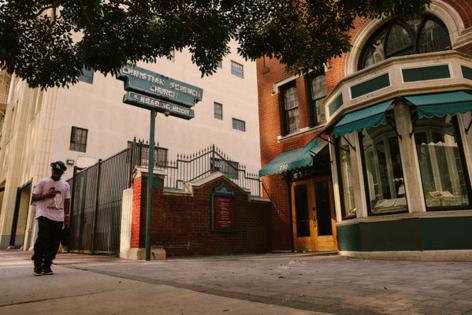
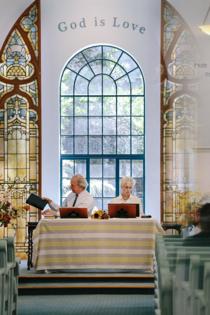
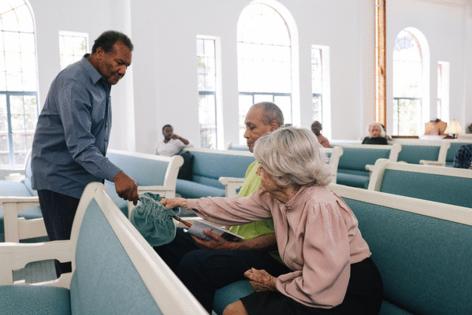













Comments